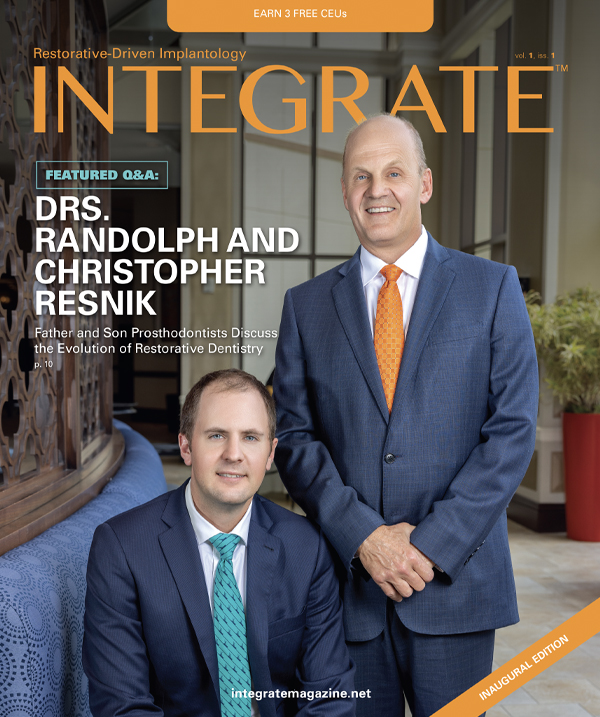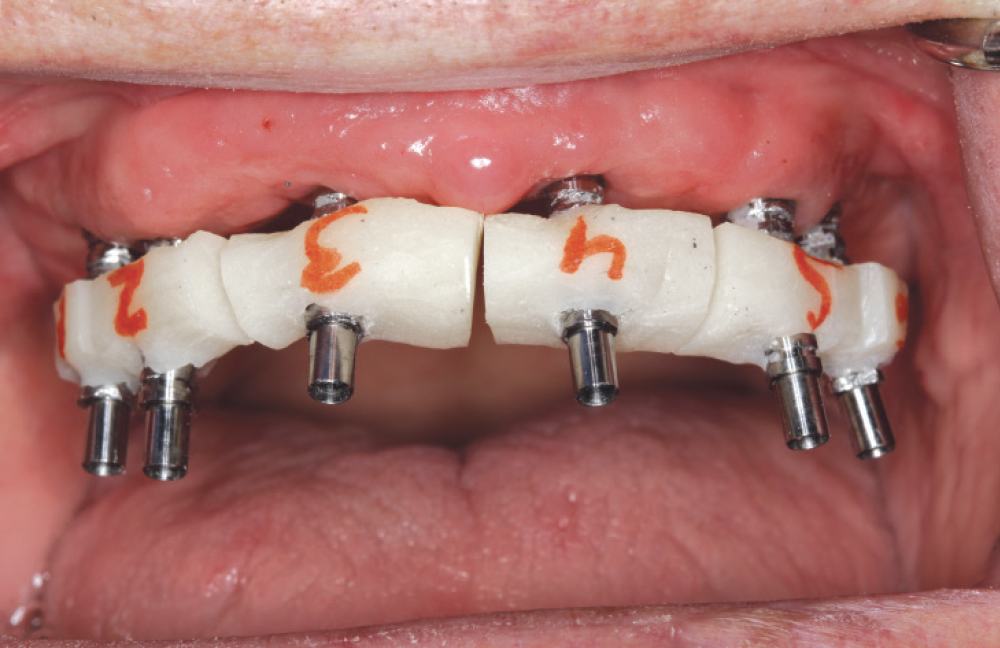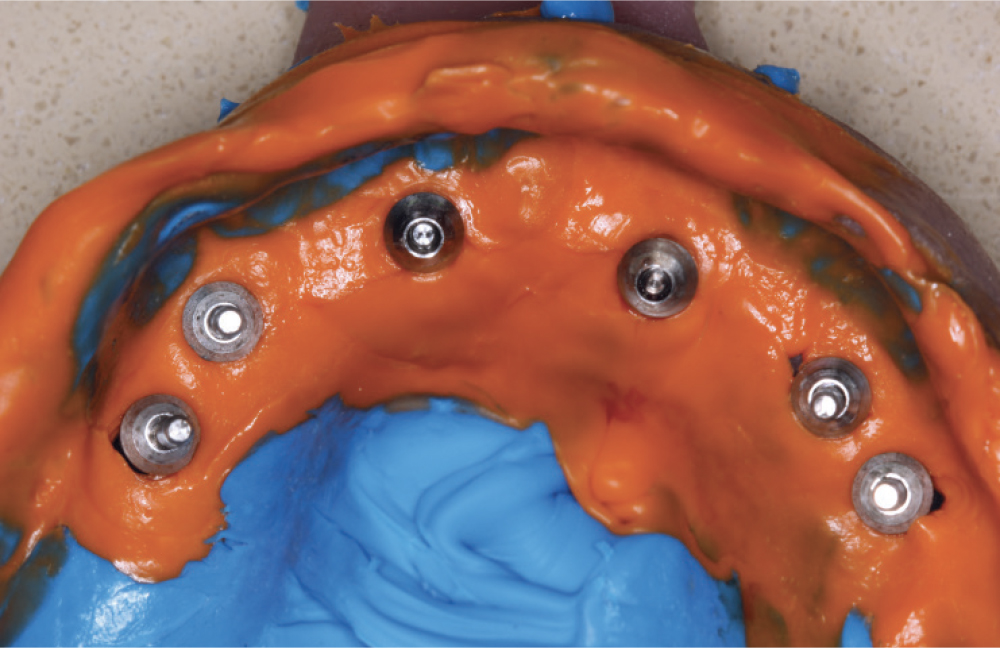The BruxZir® Implant Prosthesis vs. Acrylic Hybrids

The superiority of implant-supported restorations compared to conventional dentures cannot be overstated. By dramatically increasing prosthetic stability, implant-supported full-arch restorations significantly improve masticatory and speech functions.1 The positive impact of implant-supported prostheses on the oral health, comfort and esthetics of edentulous patients is accompanied by social and psychological benefits as well as improved personal confidence.2 At the same time, dental implants prevent bone loss, helping to preserve the shape of the patient’s mouth and facial structures.3
Acrylic hybrid dentures take the retentive concept of implant overdentures a step further by attaching to the implants through a titanium substructure, offering patients a fixed restoration that maximizes prosthetic stability. High-quality denture teeth and an acrylic base are added to the titanium framework to establish form, function and esthetics that are remarkably similar to those provided by natural dentition. The titanium framework is typically fabricated with CAD/CAM technology, and the passive fit needed for a screw-retained restoration is often achieved by validating the accuracy of the final impression with an implant verification jig.
While both removable and fixed implant-supported prostheses provide wide-ranging benefits for edentulous patients, fixed restorations have demonstrated superior impact on oral health, dental function, patient satisfaction, and quality of life.4,5 For this reason, the acrylic hybrid denture has long been considered the optimal choice for full-arch restorations. However, there is a downside: The acrylic base and prosthetic teeth that form the body of the hybrid denture are prone to wear, chipping and fracture.6
In many cases, a high degree of maintenance is required over the life of the restoration. This is because fixed full-arch implant restorations are subject to substantial forces associated with masticatory function and parafunctional habits. In the long term, this often causes hybrid dentures to break down, requiring ongoing maintenance and replacement of the prosthetic teeth or acrylic base.
Thanks to improvements in material science and advancements in CAD/CAM technology, full-arch prostheses can now be precisely milled from monolithic zirconia, offering the esthetics and functionality of an acrylic hybrid denture with the added benefit of long-term durability. The BruxZir® Implant Prosthesis is constructed from 100 percent solid zirconia, attaching to the implants through titanium copings. Exhibiting exceptional fracture toughness and flexural strength greater than 1,000 MPa, BruxZir Zirconia can withstand the functional stresses that full-arch implant restorations are subject to over time.
Unlike hybrid dentures, the entire body of the BruxZir Implant Prosthesis, including the gingival and tooth areas, is constructed from the same high-strength material. This singular construction avoids the dislodging of prosthetic teeth that can occur with traditional hybrid dentures, minimizing the chances that the restoration will need to be replaced or repaired.
The strength and durability offered by BruxZir Zirconia is complemented by its lifelike esthetics and excellent translucency. The teeth of the prosthesis exhibit color very similar to natural dentition, and advanced staining techniques are used to establish gingival areas that blend well with the patient’s soft tissue. Additionally, BruxZir Zirconia is biocompatible, hypoallergenic and wear-compatible with the enamel of opposing teeth.7
CONCLUSION
The long-term viability of dental implants has been proven time and again. The BruxZir Implant Prosthesis maximizes the odds that the restoration will last as long as the implants that hold it in place.
References
-
Rossein KD. Alternative treatment plans: implant-supported mandibular dentures. Inside Dentistry. 2006;2(6):42-3.
-
Harris D, Höfer S, O’Boyle CA, Sheridan S, Marley J, Benington IC, Clifford T, Houston F, O’Connell B. A comparison of implant-retained mandibular overdentures and conventional dentures on quality of life in edentulous patients: a randomized, prospective, within-subject controlled clinical trial. Clin Oral Implants Res. 2013 Jan;24(1):96-103.
-
Covani U, Cornelini R, Calvo JL, Tonelli P, Barone A. Bone remodeling around implants placed in fresh extraction sockets. Int J Periodontics Restorative Dent. 2010 Dec;30(6):601-7.
-
Preciado A, Del Río J, Lynch CD, Castillo-Oyagüe R. Impact of various screwed implant prostheses on oral health-related quality of life as measured with the QoLIP-10 and OHIP-14 scales: a cross- sectional study. J Dent. 2013 Dec;41(12):1196-207.
-
Brennan M, Houston F, O’Sullivan M, O’Connell B. Patient satisfaction and oral health-related quality of life outcomes of implant overdentures and fixed complete dentures. Int J Oral Maxillofac Implants. 2010 Jul-Aug;25(4):791-800.
-
Gallucci GO, Doughtie CB, Hwang JW, Fiorellini JP, Weber HP. Five-year results of fixed implant- supported rehabilitations with distal cantilevers for the edentulous mandible. Clin Oral Implants Res. 2009 Jun;20(6):601-7.
-
Clinicians Report. September 2020;1-4.










